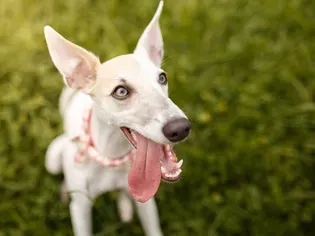Whippet: Dog Breed Characteristics & Care
Updated on 05/27/24

Whippet: The Greyhound's Graceful Cousin - A Comprehensive Guide to Breed Characteristics & Care
Introduction
The Whippet, a captivating sighthound with an aristocratic demeanor, is a breed that exudes elegance and speed. These athletic canines, often described as "the poor man's racehorse," share a lineage with the renowned Greyhound but possess a smaller, more compact build.
Breed Characteristics
Appearance:
* Size: Whippets are typically 18-22 inches tall at the shoulder and weigh between 25-35 pounds.
* Body: They have a sleek, athletic body with a deep chest and a slightly arched back.
* Head: Their heads are long and narrow, with a slightly domed skull and a prominent stop.
* Ears: Whippets possess distinctive rose-shaped ears that are carried high on the head.
* Coat: Their short, smooth coat comes in a wide array of colors, including black, blue, brindle, cream, fawn, red, and white.
Temperament:
* Affectionate: Whippets are known for their affectionate and loving nature, forming strong bonds with their owners.
* Independent: While affectionate, Whippets also possess an independent streak and can be content entertaining themselves.
* Sensitive: These dogs are highly sensitive to their owners' emotions and can be easily upset by harsh treatment.
* Playful: Whippets are playful and energetic companions, enjoying interactive games such as fetch and tug-of-war.
* Intelligent: Whippets are intelligent dogs that learn quickly but can be stubborn at times.
Care
Exercise:
* Whippets are active dogs that require daily exercise to stay happy and healthy.
* Exercise should include a combination of walks, runs, and play sessions.
* Whippets are sprinters, so short bursts of intense exercise are more beneficial than long, slow walks.
Feeding:
* Whippets should be fed a high-quality diet specifically formulated for active dogs.
* Divide their daily food intake into two or three smaller meals to prevent bloat.
* Avoid feeding your Whippet table scraps or fatty foods.
Grooming:
* Whippets have short, low-maintenance coats that require minimal grooming.
* Brush their coat regularly to remove loose hair and keep it shiny.
* Bathe your Whippet as needed, using a gentle shampoo and conditioner.
* Trim their nails regularly.
Health:
* Whippets are generally healthy dogs with a life expectancy of 12-15 years.
* Common health issues in Whippets include:
* Eye problems such as cataracts and glaucoma
* Hip dysplasia
* Von Willebrand's disease
* Regular veterinary checkups and vaccinations are essential for maintaining your Whippet's health.
Pros and Cons
Pros:
* Affectionate and loving
* Low-maintenance grooming
* Adaptable to various living environments
* Excellent with children
* Great running companions
Cons:
* Can be sensitive and prone to anxiety
* Require daily exercise to stay happy and healthy
* Can be stubborn during training
* May be prone to certain health issues
Examples of Characteristics and Care Tips
* Whippets' high energy levels: Provide them with plenty of opportunities to run and play, such as taking them to dog parks or playing fetch in the backyard.
* Whippets' sensitive nature: Avoid harsh treatment or punishment, as they can easily become upset. Positive reinforcement and gentle training methods will be more effective.
* Whippets' grooming routine: Brush their coat weekly to remove loose hair and keep it looking healthy. Trim their nails regularly to prevent overgrowth and discomfort.
* Whippets' health concerns: Consult with your veterinarian to establish a regular checkup schedule and discuss potential health issues that may arise.
Conclusion
The Whippet, with its graceful demeanor, affectionate nature, and energetic spirit, makes an exceptional companion for active individuals and families alike. By understanding their breed characteristics and providing them with proper care, you can ensure a long and fulfilling life for your beloved Whippet.
Explore More Pets

Basic Training
Puppy and Baby Introductions

Working Dog Breeds
All About Search and Rescue Dogs

Dog Treatments
Puppy Vaginitis: Signs, Causes and Treatment

Dog Adoption
After More Than 1,200 Days in the Shelter, Coco Goes Home

Basic Training
How to Train Your Puppy to Go on Potty Pads

Hybrid Dog Breeds
The Difference Between a Mutt, Mixed Breed, or Designer Dog?

Dog Treatments
Nail Problems in Dogs

Puppies
7 Reasons Why Two Dogs Are Better Than One
